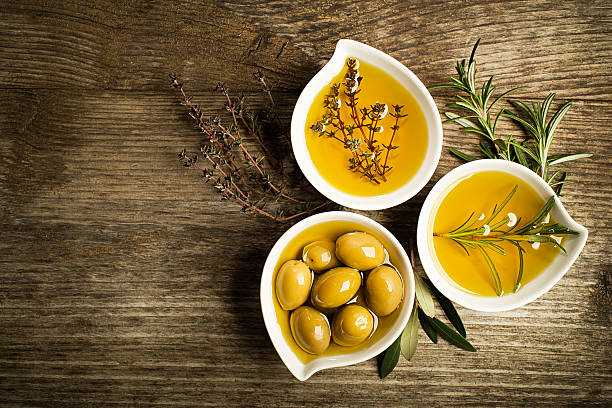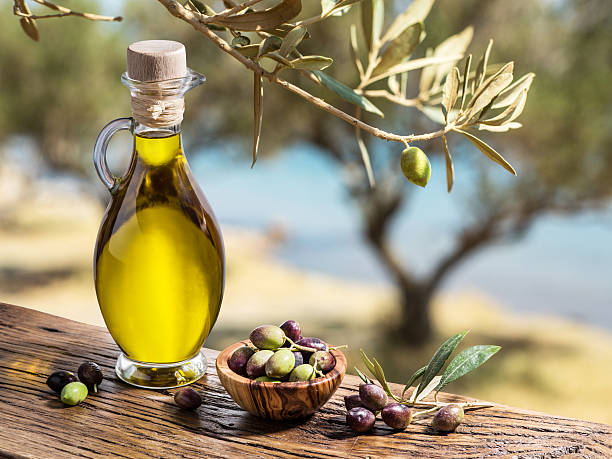Olive oil is a beneficial cooking oil with many health advantages. It also gives your food flavor. You can dress salads with olive oil in addition to using it in cooking. Is it harmful to use olive oil in the kitchen because of its characteristics, though? For instance, is olive oil flammable?
It would be beneficial to know that using olive oil poses no risks. If olive oil catches fire, we’ll let you know whether it burns easily or not. Learn several other properties of olive oil. Additionally, you’ll discover how olive oil responds to high heat, whether it can burn in the oven, and whether you can safely bake with it at 400 degrees.
What is Olive Oil?
A type of cooking oil is olive oil. Olives, the fruit of the olive trees that are customarily grown in the Mediterranean, are pressed to create it. Olives are grown all over the world, including in Spain, Morocco, Turkey, Greece, Italy, Jordan, and Lebanon.
It is used in traditional Spanish and Italian cooking in addition to Greek cuisine, and many other cooking schools have adopted it.
Chemically speaking, olive oil is primarily composed of oleic acid, a fatty acid, a combination of other fatty acids, and a small amount of flavoring agents.
is Olive Oil Flammable
Olive oil is combustible but not flammable. Flame-retardant liquids typically have flash points below 100 degrees Fahrenheit. Liquids that are combustible ignite at temperatures above 100°F. Due to its flash point is higher than 100°F, olive oil is not a flammable liquid. Like flammables, combustibles like olive oil cannot spontaneously start a fire at room temperature.
Olive oil won’t spontaneously ignite unless you use an ignition source that can heat it to its flash point. When you light a match stick and put it in a pan with olive oil, the match goes out. If the oil had a flash point below 100 °F, a sizable flame would have burst into existence. In this way, you can distinguish between a liquid’s combustibility and flammability.
You can’t expect a big flame until you’ve heated olive oil in a pan on a burner past its flash point.
Can Olive Oil Catch Fire?
After adding an ignition source, olive oil starts to burn, but not right away. It must be stronger than its smoke or flash point. Neither volatile nor flammable, olive oil. Olive oil can burn on its own because the oil molecules contain hydrocarbon chains. Avoid using olive oil in a spray bottle because of its propensity to catch fire.
Olive oil may start to boil or exhibit other signs of the high heat before it reaches flammable levels, though. You should be aware that when olive oil begins to smoke, that is when it is most likely to catch fire.
To avoid a fire, it would be prudent to drain the oil from the stove or turn it off. If it catches fire, olive oil will spread and snowball. Never, never, never think about putting it off with water. It might cause the oil to burst out of the pan, escalating the blaze.

Olive Oil’s Flashpoint, Ignition Point, Smoke Point, and Boiling Point
Flash Point
Olive oil has a flashpoint temperature of 410°F (210°C), as we previously mentioned. the point at which oil begins to evaporate and release fumes. Your olive oil will easily ignite at this point but not at room temperature. A liquid’s flash point, or the temperature at which it can easily ignite, is 100°F.
You need to add an external ignition source in order for your olive oil to ignite.
Ignition Point
Around 400–435°F (204 – 223°C) is the ignition point for olive oil. The point at which olive oil can spontaneously burn without the addition of an outside heat source. To avoid accidentally starting a fire, it is essential to understand the ignition point of each cooking oil. If a heat source is nearby when the ignition point of olive oil occurs, it could be disastrous.
Smoke Point
Olive oil has a smoke point of 374°F (190°C). Olive oil molecules will start to disintegrate at this point. The smoke point of an oil or fat is the temperature at which it begins to burn while emitting smoke. The oil may turn bluish and stop shimmering.
The smoke and ignition points are supposedly identical, according to popular belief. This is untrue since the smoking point typically falls below the ignition point. But refined oils have a higher smoke point. Remove the oil from the heat source as soon as it reaches the smoke point. It will start to burn at that moment and eventually catch fire.
Boiling Point
The boiling point of olive oil is 570°F (298°C). When the liquid’s external pressure and its vapor pressure are equal, the liquid reaches its boiling point. However, your olive oil should not reach this level. At that temperature, olive oil can result in excruciating third-degree burns.
If it comes into contact with an ignition source, a grease fire could start immediately. Food should not be placed in the oil at this temperature to prevent spray back. Your kitchen could catch fire severely if the oil splashes on an open flame.
Why Did My Oil Catch Fire While Cooking?
If you are using olive oil in cooking and it exceeds the flashpoint, it will start to smoke, in fact, with oils we normally talk about the “smoke point” rather than the flashpoint because of this.
Olive oil is burning, as evidenced by this. You may need to adjust the heat if the pan or other cooking utensil you are using is too hot.
Because they have different smoke points, various cooking oils are preferable for each application. Make sure to select the appropriate oil for the range of temperatures you will be cooking at.
What Happens When You Cook With Olive Oil on High Heat?
Heat-resistant Fatty Acids
Olive oil is primarily composed of monounsaturated fats (73%), polyunsaturated fats (1%), and saturated fats (14%). Mono- and saturated lipids have the ability to resist heat. Polyunsaturated fats can be harmed by intense heat. 84% of olive oil is made up of a combination of monounsaturated and saturated fats. Due to the presence of two fats, olive oil is heat resistant.
High in Antioxidants and Vitamin E
Antioxidants and vitamin E guard olive oil against oxidation. Oil oxidation, is the reaction of oil and oxygen to produce harmful chemicals. When the oil is heated, the process is hastened. However, it typically occurs at room temperature. Olive oil has a lot of antioxidants, which prevent oxidation even at extreme heat.
High Smoke Point
The amount of fatty acids and trace nutrients in refined olive oil is lower. If those two elements are present, the oil usually has a higher smoke point. Molecules of fat decompose at the smoking point, releasing poisonous byproducts.
Summary
One of the top cooking oils is olive oil. It won’t catch on fire, making it safe as well. As a result of its higher smoke point than most cooking oils, you can use it to prepare foods that require more heat. It is still suggested to watch it closely in order to prevent starting a fire.
Being aware of the various heating points of olive oil will help you avoid mishaps and guarantee that you use the appropriate oil for your meals. Although baking with olive oil at 400 degrees is possible, doing so is risky due to the oil’s lower smoking point.

